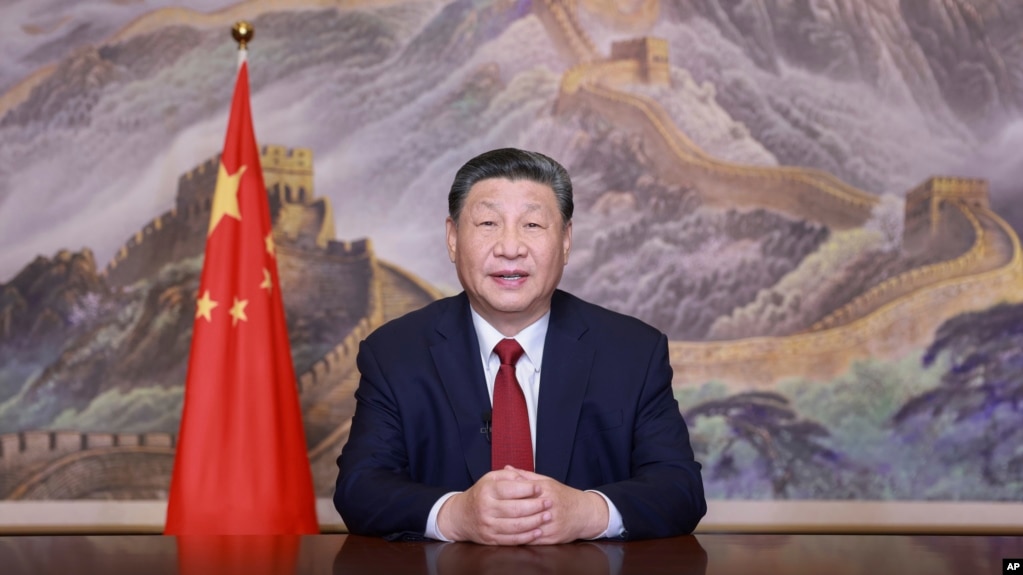
2025年伊始,中国与台湾领导人分别发表新年贺词,外界聚焦两人在台海议题上的立场与表态。专家解读指出,习近平与赖清德的讲话核心差异在于对国际社会在台海议题上的角色看法不同。赖清德强调争取国际社会对台湾的更多支持,而习近平则警告反对国际势力涉入台海事务。这一分歧很可能预示中国在新一年中的外交政策将优先聚焦于遏制国际干预台海问题。
中国国家主席习近平在星期二(12月31日)发表的2025新年贺词中对台湾发出警告说:“两岸同胞一家亲,谁也无法割断我们的血脉亲情,谁也不能阻挡祖国统一的历史大势!”就在他说这些话时,台湾军方也侦测到中国军机、军舰持续在台湾周边活动,进行空、海联合“战备警巡”。
台湾总统赖清德在他的元旦发表新年讲话中则是提到了中国带来的威胁。
他说,当前俄乌战争、以哈冲突仍在进行,“中国、俄罗斯、朝鲜、伊朗等威权政体,更持续合流、威胁以规则为基础的国际秩序,严重影响印太及全球的和平稳定。”
赖清德表示,台湾“要以民主和世界交朋友,确保安全和平。因为台湾越安全,世界就越安全;台湾越强人,世界民主防线就越稳固。”
国际社会在台海议题的角色
美国布鲁金斯学会高级研究员何瑞恩(Ryan Hass)比较了台海两岸领导人的元旦讲话后说,两人对国际社会在台海议题上扮演的角色有不同定位。

“在并排阅读习近平与赖清德的新年讲话后,两人最明显的区别处在于国际社会中跨海峡关系上扮演的角色,”何瑞恩星期四(1月2日) 在他的X帐号发帖说:“赖清德誓言要吸引更多国际支持,而习近平却做出警告不能如此。这将是2025年值得观察的地方。”
When reading Xi Jinping's and Lai Ching-te's new year's speeches side-by-side, the clearest point of departure is over the international role in cross-Strait relations. Lai has vowed to attract international support, Xi has warned against it. This will be space to watch in 2025.
曾任白宫国安会中国、台湾及蒙古事务资深主任的何瑞恩说,习近平在两岸关系方面提出了人们熟悉的主题。
“他的新变化是强调‘没有人能割断血脉亲情/阻挡中国的统一’。展望未来,习近平看似在发出信号说, 内容可以看出,中华人民共和国将在外交政策上以阻止/遏阻美国及全球涉入台海两岸事务为优先要务,”他说。
On cross-Strait relations, Xi struck familiar themes. His new wrinkle was emphasis that "no one can sever bonds of kinship/stop China's reunification." Looking ahead, Xi seemed to signal PRC foreign policy will prioritize dissuading/deterring US and global involvement in cross-Strait affairs.
赖清德以内部团结为重
至于赖清德的部分,何瑞恩说,赖清德强调台湾正在取得国际社会的肯定和尊敬,台湾对内必须巩固民主,对外也要强化与其他民主国家的连结,更要增强国防,包括全社会韧性;他也要求台湾加强经济韧性,增加对中国以外的投资,他的讲话较多篇幅着重在呼吁台湾内部不同政党的团结。
何瑞恩认为,自2024年5月赖清德就任以来台海两岸紧张升级,中华人民共和国不断加大对台湾施压,2025年在台湾没有重要选举的情况下,赖清德可能会专注于缩小台湾内部的政治分裂和推动台湾的国际地位。
Cross-Strait tensions were elevated in 2024 after Lai's inauguration and PRC's persistently rising pressure on TW. In 2025, with no major elections, Lai's attention likely will focus on narrowing political divisions at home and promoting Taiwan's international profile.
随着美国新总统唐纳德·川普(Donald Trump)将在几个星期后上任,华盛顿如何处理台海议题也是外界关注的焦点,不过有分析人士说,习近平早在与即将卸任的乔·拜登(Joe Biden)总统最后一次峰会中就画出4条红线,为未来四年的美中关系定了调,只是川普很可能不会理睬这些红线。
“四条红线”警告川普
美国外交关系协会(CFR)亚洲项目研究员石可为(David Sacks,又译大卫·萨克斯)最近在该智库发表一篇“解读‘四条红线’及其对川普警告”的文章指出,在11月习近平与拜登最后一次峰会后,北京当局说,中国有“四条不容挑战的红线”,那就是台湾问题、道路制度、民主人权及发展权利,这是有意为未来四年的美中关系预先定调。
“这个信息想要发出的对象不是美国现任总统,而是他的继任者,”石可为说,透过这‘四条红线’,中国想要为未来四年的美中双边关系定调,并“警告总统当选人唐纳德·川普及其国安团队,不要追求特定政策。”
The intended audience for this message was not the current president of the United States but rather his successor. With these “four red lines,” China is seeking to set the terms for the U.S.-China bilateral relationship for the next four years and warn President-Elect Donald Trump and his national security team not to pursue certain policies.
除此以外,石可为说,尽管中国知道美国不会遵守这些“红线”,但他们公开地将这些红线提出来,是为了让北京有机会将紧张升级的责任推给华盛顿,“辩称是因为它的警告没有得到理睬,因此它没有选择只能以反制措施来回应。”
In addition, while China likely understands that the United States will not abide by these “red lines,” publicly putting them forward gives Beijing the opportunity to put the onus on Washington for heightened tensions by arguing that its warnings went unheeded and thus has no choice but to respond with countermeasures.
台湾是第一条红线
石可为说,北京当局将台湾问题列为第一条红线并不令人意外,因为它经常称台湾是中国“核心利益中的核心”,也是美中之间最敏感的议题,美台关系在川普第一个任期中得到深化,他的政府采取的各种作为包括推进了美台安全合作、增加对台军售、派遣内阁部长访台、解密“六项保证”、将美国的一个中国政策表述方式调整为《台湾关系法》列于三个美中联合公报之前,还解除了美台官方交往的限制。
Unsurprisingly, Taiwan, which Beijing often describes as the “core of China’s core interests,” is mentioned first, underscoring that it will remain the most sensitive issue in the bilateral relationship.
During the first Trump administration, U.S.-Taiwan relations deepened. Among other steps, the Trump administration advanced security cooperation with and increased arms sales to Taiwan, sent high-level officials to Taipei (including Health and Human Services Secretary Alex Azar), declassified the Six Assurances, adjusted the formulation of the U.S. one-China policy to put the Taiwan Relations Act ahead of the three U.S.-China joint communiques, and lifted “self-imposed restrictions” that regulated contact between U.S. and Taiwanese officials.
拜登政府不仅延续了这种做法,石可为说,华盛顿还启动美台“21世纪贸易倡议”,还进一步以总统提取权及对外军事融资等方式进一步强化了美台安全合作,并邀请台湾参与民主峰会。此外,拜登本人还四度表明:美国将在台湾受到中国侵犯时协防台湾。
The Biden administration continued on this path, launching the U.S.-Taiwan Initiative on 21st Century Trade, further enhancing security cooperation by extending presidential drawdown authority and foreign military financing to Taiwan, and inviting Taiwan to participate in the administration’s Summit for Democracy. In addition, President Biden on four occasions stated that the United States would defend Taiwan against Chinese aggression, although members of his administration attempted to walk back these comments.
“中国想要中断所有这些做法,因为他们相信如果台湾被孤立,也不确定美国是否会支持它,那么它就更有可能(与中国)谈判,”石可为说,中国至少要确保美国不会给予台湾外交承认或支持它成为联合国会员,这些都是川普前一任时的国务卿麦克·蓬佩奥(Mike Pompeo)和常驻联合国代表妮基·黑利(Nikki Haley)所倡议的。
China wants to put a halt to all of this, out of a conviction that if Taiwan is isolated and unsure about U.S. support it will be more likely to negotiate. At the very least, it wants to ensure that the United States does not extend diplomatic recognition to Taiwan or support its membership in the United Nations, steps that Mike Pompeo, who served as Trump’s Secretary of State during his first term, and Nikki Haley, who served as his Ambassador the UN, have advocated.
“中国也想要美国运用其影响力来施压台湾总统赖清德,要他在跨台海议题上采取更通融的立场,”他说。
China also wants the United States to use its influence to pressure Taiwan’s President Lai Ching-te to adopt a more accommodating stance on cross-strait issues.
川普或不理睬红线
不过石可为认为,川普可能不会遵守这“四条红线”中的任何一条。
“相反的,更有可能的是美国与台湾的安全合作会继续快速进行、出口管制会更为紧缩、更多关税将被提出,美国官员也会继续凸显中国对人权的践踏,”他说,中国知道所有这些美国可能做出的举措,所以问题在于他们提出这些明知会被违反的红线是想达成什么目的。
The Trump administration is unlikely to respect any of these “four red lines.” Instead, it is far more likely that U.S. security cooperation with Taiwan will continue apace, export controls will be tightened, additional tariffs will be introduced, and U.S. officials will continue to spotlight China’s human rights abuses. China knows all of this, which raises the question of what it is attempting to accomplish by introducing red lines that are all but sure to be violated.
“北京可能试图发出信号说,美国在这些议题上的压力会引发激烈的反应,同时也建立一个它可以运用的书面记录来责怪华盛顿增加紧张,”石可为说。
Beijing is likely attempting to signal that U.S. pressure on these fronts will elicit a sharp response, while also establishing a written record that it can use to blame Washington for increased tensions.
中国再制裁对台军售美企
中国政府在新年一开始就宣布将10家参与对台军售的美国国防承包商列入“不可靠实体清单”,禁止他们在中国经商。
中国商务部期四发布公告说,“为维护国家主权、安全和发展利益”,依据相关法律将参与对台军售的洛克希德马丁、雷神、通用动力等10家公司列入“不可靠实体清单”。
商务部以“答记者问”形式说明将10家参与对台军售的美国企业实施制裁的考虑时表示:“台湾问题是中国内政,事关中国核心利益,绝不容许任何外部干涉。”
商务部说,这10家公司“不顾中方强烈反对,参与对台军售,开展所谓军事技术合作,严重损害中国国家主权和领土完整,严重违背一个中国原则和中美三个联合公报规定,严重破坏台海和平稳定”,中方根据中华人民共和国对外贸易法、国家安全法及反外国制裁法等相关法律依法“追究其不法责任”。
